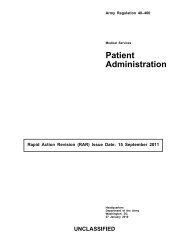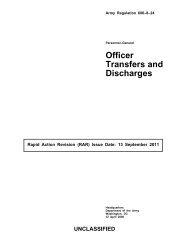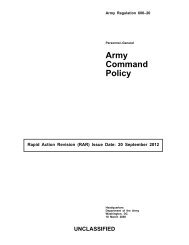Care and Disposition of Remains - Army Publishing Directorate ...
Care and Disposition of Remains - Army Publishing Directorate ...
Care and Disposition of Remains - Army Publishing Directorate ...
Create successful ePaper yourself
Turn your PDF publications into a flip-book with our unique Google optimized e-Paper software.
11–20. Dependents <strong>of</strong> civilian employees<br />
<strong>Remains</strong> <strong>of</strong> dependents <strong>of</strong> civilian employees (see para 2–15) to the decedent’s actual place <strong>of</strong> residence, <strong>of</strong>ficial<br />
station, or place <strong>of</strong> interment within the 50 states <strong>and</strong> the District <strong>of</strong> Columbia. Movement <strong>of</strong> remains to a foreign<br />
country at Government expense is not authorized. The cost <strong>of</strong> transportation to place <strong>of</strong> interment may not exceed the<br />
cost to the <strong>of</strong>ficial station or place <strong>of</strong> residence, whichever is more distant.<br />
a. When the dependent <strong>of</strong> the civilian employee dies outside the United States while temporarily away from the<br />
employee’s <strong>of</strong>ficial duty station, allowable transportation costs for transportation <strong>of</strong> remains to the place <strong>of</strong> preparation<br />
will not exceed the amount that would have been allowed if death had occurred at the <strong>of</strong>ficial station.<br />
b. When ground transportation is the sole method used to transfer the remains from the preparing mortuary to the<br />
receiving funeral, ground transportation arrangements will be made by the preparing CAC within the United States or<br />
the Director, Mortuary Affairs outside the United States. Transportation will be paid by the CAC to the contractor.<br />
c. When commercial air transportation is used to deliver the remains to the commercial airport serving the receiving<br />
funeral home with subsequent ground transportation to the receiving funeral home<br />
(1) Commercial air transportation arrangements will be made by the preparing CAC within the United States or the<br />
Director, Mortuary Affairs outside the United States. Transportation expenses will be prepaid by the CAC<br />
(2) Ground transportation arrangements from the commercial airport to the receiving funeral will be made by the<br />
receiving funeral home. The preparing CAC within the United States or the Director, Mortuary Affairs outside the<br />
United States must coordinate commercial air carrier schedules with the receiving funeral home. Transportation<br />
expenses will be reimbursed to the PADD as part <strong>of</strong> the transportation claim.<br />
11–21. Shipping processed remains from outside <strong>of</strong> the United States<br />
Generally, remains will be shipped in a casket with air tray from an <strong>Army</strong> mortuary outside <strong>of</strong> the United States.<br />
11–22. Stopover <strong>of</strong> remains en route to final destination<br />
a. One stopover (either direct or indirect routing) may be approved by the CDR, PERSCOM (TAPC–PED–D), if<br />
specifically requested by the PADD for a bona fide reason such as an invalid close relative (parents, spouse, sibling, or<br />
child) who cannot travel to the interment.<br />
b. The PADD will be advised that transportation <strong>of</strong> remains from point <strong>of</strong> origin to cemetery will be at Government<br />
expense. The PADD also will be advised that he or she will defray all costs incurred at the stopover point (such<br />
expenses may be applied toward the authorized interment allowance, providing the maximum is not exceeded).<br />
c. The PADD will be advised that no more than 72 hours will be allowed at the stopover point.<br />
d. Escort will accompany remains from point <strong>of</strong> origin to stop-over point <strong>and</strong> then on to final destination.<br />
11–23. Documents necessary for shipping remains<br />
Documents listed below are necessary for shipping remains; these documents will accompany each remains shipped by<br />
<strong>Army</strong> authorities. In addition, the shipper will work with transportation <strong>of</strong>ficials to meet any other transportation<br />
requirements.<br />
a. For shipment <strong>of</strong> remains in the United States:<br />
(1) Transit permit.<br />
(2) Certificate <strong>of</strong> death, if required. This requirement may vary from state to state. As a practice, the certificate <strong>of</strong><br />
death will be included if it is available whether or not it is required.<br />
b. For shipment <strong>of</strong> remains from outside the United States to port mortuary in the United States, use a DD Form<br />
2064.<br />
c. For shipment <strong>of</strong> remains from the United States to an area outside the United States or from one area outside the<br />
United States to another: contact the consulate or embassy <strong>of</strong> the countries involved to find out what documents are<br />
necessary to ship remains.<br />
11–24. Notification <strong>of</strong> shipment <strong>of</strong> remains<br />
The shipping activity will notify persons concerned <strong>of</strong> shipment <strong>of</strong> remains.<br />
a. When remains outside the United States are delivered to the flight line for shipment, the shipping mortuary<br />
<strong>of</strong>ficer will contact each <strong>of</strong> the following:<br />
(1) The Departmental HQ <strong>of</strong> the deceased.<br />
(2) The consignee<br />
(3) CAC in which the PADD resides.<br />
(4) CAC to which the remains are being shipped.<br />
b. When remains are shipped from place <strong>of</strong> death within the United States to final destination in the United States,<br />
the shipping mortuary <strong>of</strong>ficer will contact each <strong>of</strong> the following:<br />
(1) CAC in which the PADD resides.<br />
(2) CAC to which remains are being shipped.<br />
AR 638–2 • 22 December 2000<br />
55
















